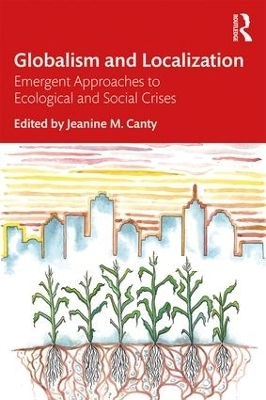
Globalism and Localization
Routledge (Verlag)
978-0-367-22261-1 (ISBN)
Considering the context of the present ecological and social crisis, this book takes an interdisciplinary approach to explore the relationship between globalism and localization. Globalism may be viewed as a positive emergent property of globalization. The latter depicts a worldwide economic and political system, and arguably a worldview, that has directly increased planetary levels of injustice, poverty, militarism, violence, and ecological destruction. In contrast, globalism represents interconnected systems of exchange and resourcefulness through increased communications across innumerable global diversities. In an economic, cultural, and political framework, localization centers on small-scale communities placed within the immediate bioregion, providing intimacy between the means of production and consumption, as well as long-term security and resilience. There is an increasing movement towards localization in order to counteract the destruction wreaked by globalization, yet our world is deeply and integrally immersed within a globalized reality.
Within this collection, contributors expound upon the connection between local and global phenomenon within their respective fields including social ecology, climate justice, ecopsychology, big history, peace ecology, social justice, community resilience, indigenous rights, permaculture, food justice, liberatory politics, and both transformative and transpersonal studies.
Jeanine M. Canty, PhD, is professor at Naropa University. A lover of nature, justice, and contemplative practice, she focuses her teaching on the intersection of social and ecological justice and the process of worldview expansion and positive change. She is both an editor of and a contributor to Ecological and Social Healing: Multicultural Women’s Voices and selected works featured in The Wiley Handbook of Transpersonal Psychology, the International Journal of Transpersonal Studies, Sustainability: The Journal of Record, World Futures: The Journal of New Paradigm Research, Shadows & Light: Theory, Research, and Practice in Transpersonal Psychology, and The Body and Oppression: Its Roots, Its Voices, and Its Resolutions.
Introduction 1. Climate Justice and the Challenge of Local Solution 2. The African Burial Ground: Roots of Ecological Destruction and Social Exploitation 3. The Ties that Bind: An Earth Based Story of Home 4. Food Justice, Permaculture, and Global Urban Strategy 5. The Declaration of Ek Balam: Protecting the Sacred in Corn 6. The Paradox of Digital Technology in Social Movements 7. A Climate Justice Compass for Transforming Self and World 8. The Evolution of the Environmental Justice Movement: Trans Local Voices for Systemic Transformations 9. Ethical Path to Ecological and Social Survival 10. Living La Vida Local: Small Steps Toward Global Change
| Erscheinungsdatum | 05.06.2019 |
|---|---|
| Zusatzinfo | 2 Line drawings, black and white; 2 Halftones, black and white |
| Verlagsort | London |
| Sprache | englisch |
| Maße | 152 x 229 mm |
| Gewicht | 843 g |
| Themenwelt | Naturwissenschaften ► Biologie ► Ökologie / Naturschutz |
| Sozialwissenschaften ► Soziologie | |
| Technik ► Umwelttechnik / Biotechnologie | |
| Weitere Fachgebiete ► Land- / Forstwirtschaft / Fischerei | |
| ISBN-10 | 0-367-22261-2 / 0367222612 |
| ISBN-13 | 978-0-367-22261-1 / 9780367222611 |
| Zustand | Neuware |
| Haben Sie eine Frage zum Produkt? |
aus dem Bereich


